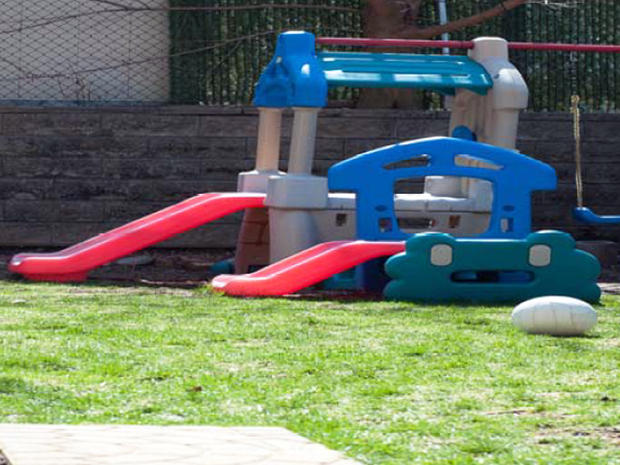Mothers to do jail time at home under new program
NEW YORK The team behind a promising alternative-to-incarceration program for women in Brooklyn, N.Y., is launching a new initiative to coincide with Mother's Day that will allow convicted mothers to carry out their sentences in their own homes.
Brooklyn District Attorney Charles Hynes and his two assistant DAs, Mary Hughes and Teresa Fabi, opened Drew House, a residence for homeless convicted moms to live with their children and complete their sentence instead of going to jail, in 2008.
Olgita, 25, moved into Drew House on Mother's Day two years ago. She has three children, ages 8, 7 and 2 years old.
She was arrested for possession of a weapon when her youngest was just one week old.
"I was so worried; I didn't know what to do. I was at Rikers [Island] for three days, and I didn't eat; I just cried for three days," Olgita told CBSNews.com.
Olgita was arrested in front of her children, who went to live with her mother. She was facing three to five years in jail.
"I was so happy when they told me about this [Drew House]," she said.
Based on the success of Drew House, the Brooklyn DA is now launching Justice Home, which will give convicted female felons the right to serve their sentence in their own residence while retaining custody of their children.
The new program has funding for 45 women; participants must be facing a minimum sentence of six months in prison. Similar to Drew House, they will receive intensive treatment and supervision. The DA's office received their first call about a participant this week.
"What we have been doing does not work, it's ineffective, it's expensive, and it's creating more problems than we are solving. So we need to be smarter," Teresa Fabi told CBSNews.com about the incarceration system.
According to the National Resource Center on Justice Involved Women, over 66,000 women incarcerated nationwide are mothers of minor children.
Fabi said children who are separated from their parents, particularly their mothers due to prison time, suffer extreme stress and perform badly in school, often becoming alienated and hostile.
These programs provide an alternative for female defendants who would otherwise be incarcerated.
"I've seen generations of people in jail, mothers and children and grandchildren," said Fabi.
It's also cost effective. According to Housing Plus Solutions, $34,000 is spent annually to house a mother and two children at Drew House; the Justice Home program will cost even less, $10,000 annually, compared with $129,000 for incarceration and foster care.
Olgita has finished her mandatory sentence but is staying on at Drew House.
The women are allowed to stay there as long as they need to find a home.
While they live at Drew House, they must observe a curfew, which starts at 7 p.m., and sign in and out. They must also make weekly visits to treatment centers and monthly visits to their supervising case officer.
"They [the children] would ask, 'Why do we come home at 7 p.m.?,' so I had to tell them I'm doing jail time; some days they were OK with it, some days they cried. I said, 'Mommy has to be on her best behavior,'" said Olgita.
Fabi believes programs like Drew House and Justice Home help keep families intact and reduce recidivism among women.
"These programs really are about the children, and it's about interrupting this generational cycle, that's really the key thing here. You're not making society safe for the rest of us by keeping to incarcerate these women who do not need to be incarcerated," said Fabi.
"I have people who've told me there was no food in the house because their mother took the box of cereal and sold it for crack; how do you say that kid has the same choice as the person whose mom is sitting at home baking cookies waiting for them at 4 o'clock?" she said.
Now that Olgita has completed her sentence, she can return to Drew House in the evenings when she wants, but her days revolve around her children and getting her General Educational Development diploma.
"I'm up at 6:15, the oldest one is on the [school] bus at 7:10 then I do my personal household chores and then I pick them up, we do homework, read a book, and watch TV," said Olgita.
"I love it. All the women sit around and talk about everything, all the kids play together, we have a backyard," she said.
Fabi said these programs are designated to help single mothers and their children; the moms receive the social services they need while the kids still get to live and grow up with their mothers.
"For the most part, they need support; they need help to be better mothers. A lot of us have modeling for what a mother should be. If you don't have that type of modeling, it doesn't necessarily come naturally to know how to be a mother, but what does come naturally is this fierce love both from the mother to the children and the children to the mothers," said Fabi.
The National Resource Center on Justice Involved Women says 60 percent of women released from incarceration are re-arrested and nearly a third return to prison.
However, not one participant that has left Drew House has been re-arrested.
"I've been a single mother since the age of 15, and I just love my kids, and to spend birthdays and holidays with them and to wake up and go to bed with them, it's a feeling I can't explain," said Olgita.
This Mother's Day, for the third year in a row, Olgita will get to spend the day with her children.
"I am going to cook, and stay in the house with my mother and sisters," she said. "My older one made me a card at school, and the younger one made me a card with flowers."

